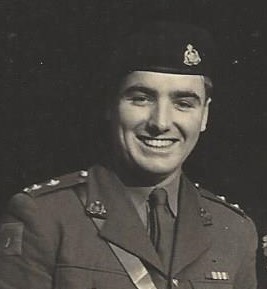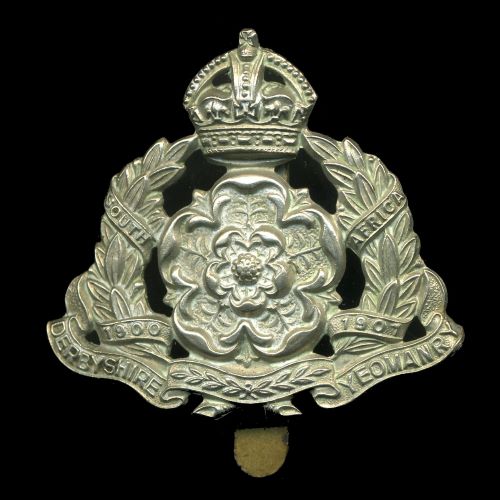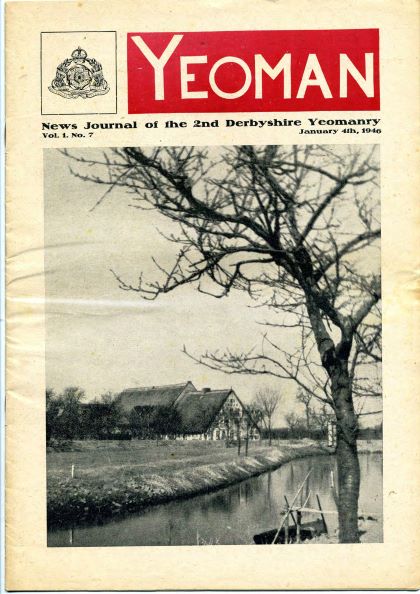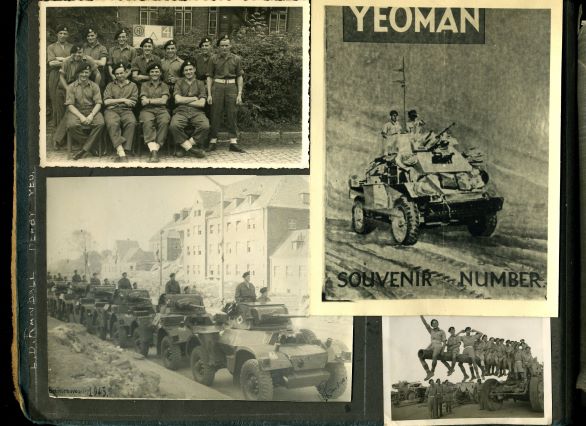
John Barton
Rank: Lieutenant
Memories of Lieutenant John Barton
John Barton was admitted to the Royal Military College Sandhurst on 24th July 1943 and completed the emergency officers training course on 15 January 1944 whilst still only nineteen.
The Regiment’s War Diary records that he joined the 2nd Derbyshire Yeomanry in Normandy on 16th July 1944.
What follows are the notes which John made whilst reading “The Second Derbyshire Yeomanry An account of the Regiment during the World War 1939-45” by Captain A J Jones MBE. John records his role as officer in charge of assault troop carriers “A” Squadron and the page numbers are those mentioned in Captain Jones’ book.
John was one of ten officers from the regiment who, with wireless sets, joined various battalions and brigades of the 51st Highland Division which were involved in Operation Plunder, the crossing of the Rhine, which commenced at 9 pm on 23 March 1945.
John’s detachment was with the 7th Battalion of the Black Watch.
Page 76
“There were six lads and I went to get them. We all dived into partially dug slit trenches. The lad who went “bomb happy” was with me and he ended up screaming and clawing the earth with his hands. He was immediately evacuated home.”
Page 81 16 August 1944
“I was up front with my troop and I am sure that this was where I and my driver Blakely were deafened and suffered ear damage.
Major Meaby came forward to ask me what was happening.
I told him it was pretty bad and we were waiting for the infantry to come and clear. I told him where the enemy were dug in but against my advice he wanted to see for himself. A few minutes later he was shot and lost part of his face. He is still alive.
Lt ______ went “bomb happy” stood up in his armoured car and fired a very light pistol. Got him back but he recovered in a couple of weeks.
Page 86 27th September 1944
“Reg Bent and myself were dug in just containing the German Garrison in Dunkirk. Squadron Commander told us to recce on foot to see what was there on one road we were covering. Reg went first night got 30 to 40 yards all hell broke loose but he immediately got back with all his troop. It would have been my turn next night but it was decided by strong words from the ? that it was a thankless task!! So no more recces.
Page 88 19th October 1944
“Curley” hated the Germans. Great fellow. Spent most of his time with Reg and myself. Lots of stories can be told.
Page 90 24th November 1944
“On the island at Nijmegen was a sweet factory. Lovely packed boxes and trays of various chocolates. Guess whose troop had most?
Page 93 25th December 1944
“I had to take my carrier troop this long distance with the roads 75% pure ice. Really we slithered the distance on our tracks.
Page 104 19th February 1945
“Goch was a rather large town absolutely flattened. We spent most of out time going from cellar to cellar.
Page 106 23rd March 1945
“When I went with the infantry over the Rhine it made my mind up never be an infantry man although they always told us they would never swop to being recce. It also taught me what marvellous men the padres were. When I got over the river with the infantry there was a padre comforting a trooper on the mined bank who had had his foot blown off by a mine.
11th April 1945
“After the Rhine crossing because I went over with the infantry I was given 2 weeks UK leave.
Unfortunately whilst I was away Sgt Charlie Camden who fathered me as my troop sergeant when I took over the troop took his carrier across a mined field got blown up and killed with the driver Bill Tilley. He had taken over the troop but he knew he should never have got anywhere [near] a suspected mined field. The only two I lost. Nobody else. Not even wounded.
On my return there was a temporary sergeant in command who I did not like and I am sure the feeling was mutual. He said “I never thought I would say this sir but thank god you are back to look after us.” From him this was praise indeed.
Page 114 14th April 1945
“My troop were occupying the bank when shells fell in the river in front of us. I radioed back to tell them to increase their range to get the Germans on the opposite bank. The next lot of shells fell on our side of the bank. I radioed increase range not decrease. They radioed back saying it was not them shelling. It must be the enemy. Fortunately the shelling stopped.



